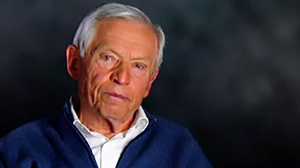Contributions and Sacrifice
The producers of The Bombing of Germany asked veterans and experts alike the following question: “What contribution, if any, do you think the bombing campaign had on bringing about the end of the war in Europe?” Here are their responses.

Al Anderson, Veteran: I think our impact was great, very great, because of the disruptions we caused and the impediments we caused to their industries and what have you. And I think even the senior leaders that didn’t kill themselves after the war acknowledged our importance, and some of them said we wouldn’t have won it without us. But I’m not qualified to say that. But I think the impact was great.
Richard Overy, Historian: There’s no doubt that bombing did have very serious effects on Germany and it did reduce Germany’s capacity to be able to wage war effectively at the fighting fronts. It reduced the supply of weapons that were available, it forced Germany to divert very large resources to the defense of the Reich and it speeded up the progress of the land armies in the final destruction of the German armed forces in 1945. From that point of view, a case could probably be made to argue that bombing, whatever it did in terms of civilian deaths, was justified because it stopped the deaths of more Allied soldiers and the deaths of occupied Europeans and that the Third Reich was an extraordinary system responsible for the violent deaths of 10 million people perhaps in Europe and that was the prime consideration.
I think it’s certainly very important to recognize that the war had to be ended as soon as possible, but I think it can certainly be argued that if you diverted resources from bombing perhaps from the last stages of the war and focused more on the strength of the armies, or producing a much larger fighter bomber force you might have produced the same military outcome, but with a lower level of civilian loss and destruction in Germany itself. So it’s certainly important to end the war and bombing certainly contributes to that, but I think it’s not the only way the war could have been ended.
Sam Halpert, Veteran: At the time, I thought, well, at least I was part of the thing that helped this war end sooner. That’s always my thought. But that’s about it. But I also knew that I, Sam Halpert, hadn’t won the war, you know, there were thousands of guys like me, you know. That’s what I felt, and I still feel that way.
Bud Porter, Veteran: I knew what the British were doing, but I thought we were doing the right thing. I thought we actually were doing the right thing: bombing strategic targets. And I am convinced, and this is only a personal opinion, convinced that we were probably the biggest factor in defeating Germany, because we destroyed their industrial capability. Absolutely destroyed it. Now, there were a lot of things they did to counteract what we did. They dispersed their landing fields and whatnot. Planes– Well, of course they didn’t have any planes left by the time we got through with them, but I am convinced that the 8th Air Force was the major factor in defeating Germany.
Con Crane, Historian: The destruction of the German rail system is one of the key ingredients that brings down the German economy, and it’s another key factor in the fuel shortages and coal shortages that show up throughout Germany. And the same idea applies to the whole war in Europe, we don’t know which act, which campaign was the one that really brought down the German war machine. Their impacts all combine together. It helps having a few hundred Russian divisions coming in from the East, the importance of that is hard to deny. But all the other pieces were important as well.
There are examples of air operations that have considerable impact, like Jimmy Doolittle’s bombing of Rome. It’s one air attack that’s timed at a very important point, and helps bring down Mussolini’s government because of the reaction it causes. So there are times that when one of these aerial attacks did have a major strategic implication. You’re never quite sure when that’s going to be. A couple different concepts that show up in the political science literature… are coercion and compellence. For coercion, you create enough threats on people or manipulate them so they make or do a certain thing on their own. Compellence is when you go down and put a bayonet to their throat and force them to do what you want. It’s a little easier to tell cause and effect when you compel somebody than when you coerce them. And in many ways, that’s what we do to the Germans in World War II. We compel. Arguably, what happens in the Pacific is coercion, because we do not invade Japan. We don’t have to. In Europe, we had hoped to coerce with air power. We don’t. We end up compelling with a joint and combined force that overwhelms the German state.
Keith Lowe, Historian: The bombing campaign did not in the end achieve the results that bomber Harris and many others hoped they would. On the other hand, they did have a huge effect on the course of the war. Germany was forced to divert so many of its resources in defending themselves against the bomber attack and those were resources they could have been deploying on the ground against the British and the Russian and American attacks by the armies. So by diverting these very scarce resources away from the army fronts actually the bombing offensive had a huge result.
Tony Iveson, Veteran: In his victory speech, Churchill referred to many units, which had contributed to victory, but he did not mention Bomber Command. And that really wounded Harris because we lost 55,000 aircrew in the Second World War in Bomber Command alone. Yes, Churchill did turn his back on us. Well I felt like, I felt like the rest of my colleagues, we had done our duty… I had been flying; I had been in service from September 1st 1939, to May 8th, no – later than that, 1945. I felt I had done my duty. I felt I’d made, I didn’t make much contribution in fighter command, but I felt by the time I was bomber pilot I knew what I was about. And I think I was capable and I think I did a job on 617 Squadron… I believe Bomber Command made a major contribution to the victory in Europe. It was the only British force from June 1940 to June 1944 that was able to take the war to Germany. And the Germans in their blitzkrieg killed about 43,000 English civilians. And if they could have done more they would have done. But they didn’t have the aircrafts or the weapons that we did later on.
Bill McCrea, Veteran: One of the great regrets (and still a great regret) is [for the] people of bomber command [who were] shunned immediately after the war. Things are changing now. People realize that we were only doing a job. But you know we never got any recognition, we never got a campaign medal and I think this is frightful; all those people lost and they had nothing to show. Not so much the people [who died], because if you’re shot down and killed you [are] not worried if you get a campaign medal or not. But the people behind who lost so many of these young men. They went off and lasted 2, 3, 4, 5 trips with nothing to show except a brown paper parcel effects bag and that was the end of it. You know it wouldn’t have hurt to give them a campaign medal, something that could be handed down from generation to generation.
Verne Woods, Veteran: It’s very difficult for a person to understand that you were there, you had a sense of duty, and you had to be there. You weren’t heroes of any kind. And now you look at people and they praise the air crew members, but at that time, I didn’t think we were deserving of any particular praise.
Tami Davis Biddle, U.S. Army War College Professor: The [U.S. Strategic] Bombing Survey [1945 – 1947] is a series of over 300 reports. So a little bit like the Bible, you can find anything in it that you’re looking to find. Because the survey has so many individual reports, you can find in it almost anything that you’re looking to find. What most people read were the summary reports. And the summary reports were supportive of the idea that air power had been “decisive” in the war in Europe. Now, that’s a very interesting statement because it says air power, not strategic bombing in particular. And air power covers not only strategic bombing but ground attack, fighters, all the assistance that was given to ground troops, to navies, etc., etc.
It also was fairly positive, though, on the idea that by the end of the war, the Americans had found some key node targets. One of these was transportation and railway traffic. And most importantly, highlighted in the survey was German oil. And I think German oil, by the end of the war, was in fact a kind of bottleneck target. Because of the advance of the Red Army from the East, the oil supplies in southeastern Europe were being eliminated. Because of the advance of the Anglo-American armies, the oil supplies in the West were being eliminated. Germany was being squeezed onto her own resources. So she was trying to create synthetic oil. The heavy attacks on synthetic oil did really make it quite difficult for Germany to fight a war of maneuver. You need oil, you need fuel to drive tanks and to fly airplanes. If you’re being squeezed from both sides and running out of your indigenous sources and your synthetic sources, you just don’t have anything to put in the engines of your machinery. And so at the end of the day, the American theory of finding a bottleneck or a key node target did, in a sense, hold up. And that target was oil.
And all throughout the war, both the British and the Americans had been attracted to the oil target. The British, from very early on in the war, had tried to attack oil. But it was a sort of hopeless situation when Germany was expanding and taking over lots of other territory and bringing in new sources of oil in the early part of the war. By the end of the war, however, it’s a completely different scenario. Germany really is dependent on this sole commodity. There’s no substitute for it. And once it’s run out, it’s run out.







